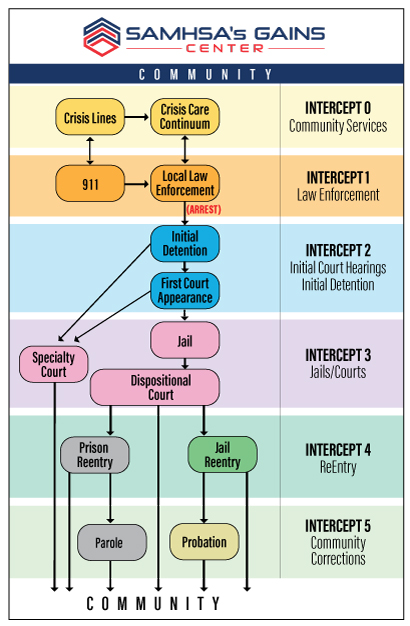
Understanding the Sequential Intercept Model (SIM)
The Sequential Intercept Model (SIM) is a framework that illustrates how individuals with mental health and substance use disorders interact with the criminal justice system. The model outlines various "intercepts" or points of contact where diversion from the justice system into treatment and supportive services can occur. These intercepts range from community-based crisis intervention to reentry support after incarceration.
How Hope, Love, and Dream, Inc. Integrates with the SIM
At Hope, Love, and Dream, Inc., we are deeply committed to aligning our services with the principles of the Sequential Intercept Model. Our organization is strategically positioned to intervene at multiple points along the SIM, offering tailored support to individuals and families impacted by the justice system. Here’s how we tie into each intercept:
Intercept 0: Community Services
We proactively work within communities to provide accessible mental health and substance use disorder services, reducing the need for law enforcement intervention. By collaborating with local organizations and crisis care providers, we strive to divert individuals from entering the justice system altogether, connecting them with the necessary treatment and support.
Hope, Love, and Dream, Inc. partners with law enforcement agencies to offer alternatives to arrest for individuals experiencing mental health or substance use crises. We provide training and resources to law enforcement personnel to help them identify and divert individuals to appropriate community-based services instead of pursuing criminal charges.
Intercept 2: Initial Court Hearings/Initial Detention
Our organization collaborates with court officials, jail clinicians, and social workers to identify individuals who would benefit from diversion to community-based treatment during the early stages of the justice process. We work to ensure that those with mental health and substance use disorders receive the necessary care instead of facing prolonged detention.
Through our partnerships with local jails and courts, we facilitate the diversion of individuals from incarceration into community-based treatment programs. Our services aim to prevent the exacerbation of mental health conditions during incarceration by providing continuity of care and access to supportive services.
We strive to play a vital role in supporting individuals as they transition from incarceration back into the community. Our reentry programs focus on linking individuals with mental health and substance use disorder treatment, housing, and employment opportunities, reducing the likelihood of recidivism and promoting successful reintegration.
Intercept 5: Community Corrections
Hope, Love, and Dream, Inc. works with community corrections programs to provide added support for justice-involved individuals with mental health and substance use disorders. We offer tailored services to help these individuals adhere to their supervision requirements and avoid reentry into the justice system.
Our Role in Community Collaboration and Strategic Planning
Through our engagement with the Sequential Intercept Model, Hope, Love, and Dream, Inc. collaborates with various community leaders, agencies, and systems to identify gaps in services and develop strategic action plans. Our involvement in SIM mapping allows us to contribute to the creation of customized, local maps and action plans that address the specific needs of our community.
Partner with Us
By partnering with Hope, Love, and Dream, Inc., you can help us expand our reach and enhance our impact across all intercepts of the SIM. Together, we can continue to develop and implement evidence-based practices that divert individuals from the justice system and into the care they need.
For more information about our programs and partnership opportunities, please contact us at Info@HopeLoveDreamInc.org